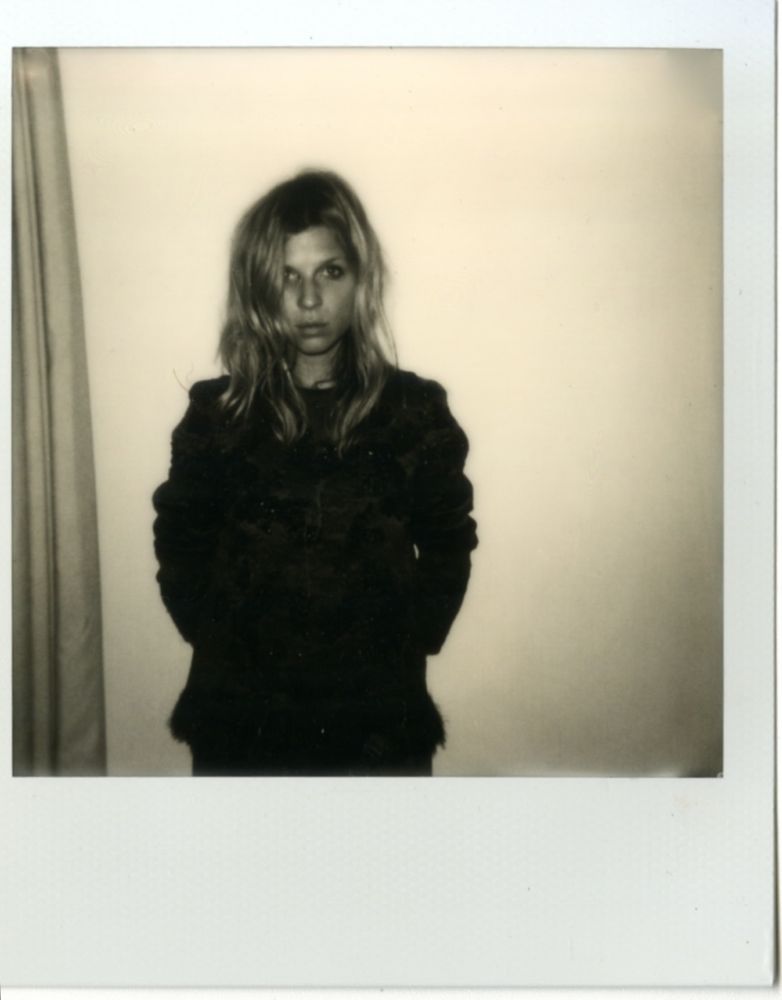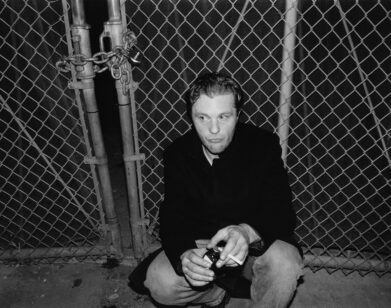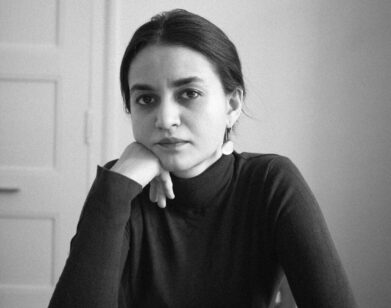The Couple Next Door

ABOVE: CLÉMENCE POÉSY AT THE TORONTO FILM FESTIVAL, SEPTEMBER 2015.
A large London house is divided into two apartments occupied by two well-to-do couples expecting their first child: Kate (Clémence Poésy) and Justin (Stephen Campbell Moore) live on the top floor, Teresa (Laura Birn) and Jon (David Morrissey) have just moved into the bottom floors. Kate didn’t think she wanted to be a mother, but changed her mind over the course of her 10-year relationship with Justin. Teresa and Jon have been trying to have a baby for seven years.
The Ones Below, which premiered at the Toronto International Film Festival earlier this month, is not a horror movie in the traditional sense, but it’s pretty terrifying. Written and directed by David Farr, the film explores loss, desperation, and inter-personal dynamics—between spouses, neighbours, members of the same sex. “Kate’s downfall is really her isolation and loneliness,” explains Poésy.
Now 32, Poésy has been acting for 15 years and splits her time between London and Paris. She’s perhaps most famous for playing French beauty Fleur Delacour in the Harry Potter series and as one of the faces of Chloé’s Love Story perfume, and is currently starring The Tunnel, the British adaption of the Swedish series The Bridge. Like many of her peers, Poésy generally avoids watching herself on screen. “Sometimes, what you’re not comfortable with as a person—your ego or vanity—is actually really good for the character,” she says.
EMMA BROWN: How did you hear about The Ones Below?
CLÉMENCE POÉSY: I was sent the script by my English agent and really liked it, but was worried about that fact that the character was English, and whether or not that would be an issue. I had a Skype conversation with [writer-director] David [Farr] who was like, “People in London come from all over the place.”
BROWN: Your English accent is very good.
POÉSY: I started freaking out about it before we started filming because all of a sudden he cast an English mother. For us, Kate’s half French and maybe she’s been raised in France away from her mum. Quite clearly, she has not been raised by her mum. All of a sudden I was like, “I haven’t worked on this!” I didn’t get a coach. I guess it’s quite close to me because I live in both London and Paris, so my accent is a bit of a weird mix. David was quite keen on not worrying about it that much. He left out all the references I was making: “She needs to say she was raised in France, she needs to say it at some point.” He said, “I’ll write it in a scene if you want, but it won’t make the final cut.”
BROWN: So you came up with that backstory for Kate with David?
POÉSY: Yeah, together. He had a very precise idea of what childhood she’d had. I sort of mixed in things that I thought about. I think she’s very interesting. She’s a loner, even as a kid, and the only real friend she ever had was her brother. It’s quite interesting to keep that thread present, and then Teresa comes into her life. The whole story with her mum makes her relationship with other women a bit tricky.
BROWN: Do you think Kate could have been friends with Teresa under different circumstances?
POÉSY: I think she would have loved to. I think she likes how unlike her Teresa is and how much joy she brings. It’s like she brings something simpler—an enjoyment that’s a bit more grounded. Kate lives in her head all the time.
BROWN: But there is something eerie about Teresa from the beginning. She’s a bit of a Stepford wife.
POÉSY: Yeah. She likes Teresa’s energy and apparent joy, but I think she sees through it. She’d probably be quite keen to help even though no one is asking her. I think there’s a real fascination.
BROWN: The terrifyingneighbor is its own sub-genre of film. Did you think about that when you signed on?
POÉSY: Yeah. You can’t not. It’s what I like about it, it references all those films in its own way. David’s quite open about taking on the genre as a style. He asked all of us to watch Rosemary’s Baby. Another film he asked us to watch was Persona, an Ingmar Bergman film. He talked about Rear Window, which I’ve seen.
BROWN: You’ve said in the past that you were cast in English movies before you were cast in French movies. Is that still true?
POÉSY: It’s changed a lot lately. I’m about to start a French film and I shot a French film earlier this year. It’s really weird; now French people always cast me as always having British origins. In the next French movie I’m doing and the last one I did, I’m playing English girls.
BROWN: Do you alter your French accent for that?
POÉSY: No. I really want to alter it because I love doing an English accent in French. I can’t seem to convince directors to do it. “I can make it really subtle, I promise!” They never want to let me do it.
BROWN: Are you someone who likes to do a lot of takes?
POÉSY: It depends on the scene. I like working with people that don’t do many takes because there’s a thrill and excitement of trying to find something really quickly. But I also like going further in details. Some people very famously do 70 takes, and I’ve never done that, so I don’t know what it feels like. I’m sure really interesting stuff comes out of it. I find in theater I can’t do plays for very long. I don’t know how people do the same play for six months. I like the first three weeks and then I just feel like I’m going crazy. Once the adrenaline is gone, you’re just sort of looking at yourself like, “I’ve said that.” It becomes so much a part of you. I always have a weird moment around two months where I feel like I’m going slightly insane.
BROWN: If you could go back to when you did your first film and tell yourself something, what would it be?
POÉSY: That you can know things about your characters that directors don’t know. You’re allowed to keep secrets. [At the beginning,] I was just really happy to show up and do the job, just follow one’s lead, which is great and it is essential, and you still have to do it. But what I really enjoy now is when a director says, “Wow, you seem to know things about her that I don’t know.” You have to make sure that they make sense for the film they’re trying to make. It’s a collaboration. I’ve seen the beauty of preparing. In France, there’s a tradition where it’s more about inspiration and something in the moment and letting things happen. But from working with English actors and seeing the beauty in the precision of their work because of the detail that they’ve come up with, I think that’s something I would’ve liked to know earlier.
BROWN: When did you figure that out?
POÉSY: Quite recently. I worked on a TV series called The Tunnel with an English actor called Stephen Dillane. He does that beautifully. We just finished the second season; you shoot for six months and you’re with that person for six months with different directors coming in. You get to see the way they work much better because the setting brings it out even more. [Also] a bit earlier, on a movie about Joan of Arc that I shot where the movie took a long time to happen—it was going to be shot one year and then it got pushed back, and then it got pushed back another six months. We shot it maybe a year and a half after I met the director for the first time. During that year and half, we kept talking and sending each other stuff. I drew a lot of copies of pictures he was sending—Francesca Woodman pictures—to try to make them my own somehow. That time allowed us to be able to not say anything on set, but to understand each other. Of course it’s not ideal, you don’t want a film to have such a tricky financial process, but for us it was quite useful.
BROWN: When you have the time to really build a character like that, is it harder to get out of them?
POÉSY: Not really. I say that, and then sometimes there are characters where I feel it would be wrong to over-build. I don’t really have a method. I think, for me, it’s about being flexible enough to understand what you’re getting into. It’s not harder to let go. They always stay anyway as friends, I guess. Actors’ heads and minds are just full of old imaginary friends—the characters that you’ve done that you felt like you’ve known really well and then you have to let them go but they’re still there. It’s weird. They don’t really inform my own life, but they inform each other. And very often, I can relate one character to another and go for that strength or that quietness. Somehow they stay in touch with each other.
BROWN: Did you have an imaginary friend as a child?
POÉSY: Not at all. I had a sister. I was much more practical. She’s two years younger than me so we were always together.






